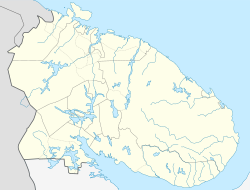Olenya air base
| Olenya Olenegorsk/Vysokiy | |||||||
|---|---|---|---|---|---|---|---|
Оленегорск/Высокий | |||||||
| Olenegorsk, Murmansk Oblast in Russia | |||||||
 Satellite imagery of Olenya air base | |||||||
| Coordinates | 68°09′06″N 33°27′54″E / 68.15167°N 33.46500°E | ||||||
| Type | Air Base | ||||||
| Site information | |||||||
| Owner | Ministry of Defence | ||||||
| Operator | Russian Aerospace Forces | ||||||
| Controlled by | Long-Range Aviation | ||||||
| Site history | |||||||
| In use | 1957 - present | ||||||
| Airfield information | |||||||
| Identifiers | ICAO: XLMO | ||||||
| Elevation | 214 metres (702 ft) AMSL | ||||||
| |||||||
Olenya (also Olenegorsk) has been a major Russian Navy reconnaissance base, located on the Kola Peninsula 92 km south of Murmansk. As of 2020, units at the base are subordinate to the Long-Range Aviation branch of the Russian Aerospace Forces.[1] The base and its staff settlement (Vysoky, Murmansk Oblast), across Lake Permusozero from the city of Olenegorsk, are served by the Olenegorsk rail station (formerly Olenya station). Olenya has served as the headquarters for 5 MRAD (Naval Reconnaissance Air Division), and has hosted two reconnaissance regiments. Its 3500-meter runway is the longest on the Kola Peninsula, making it a key facility for intercontinental flights across the North Atlantic basin.
The base is home to the 40th Composite Aviation Regiment as part of the 22nd Guards Heavy Bomber Aviation Division.[2]
Olenya was first detected by US intelligence in 1957, and was listed as having a runway length of 3350 m (11,000 ft).[3] The base served as a forward deployment field for Long Range Aviation and was one of nine Arctic staging facilities for nuclear strikes on the United States.[4] An analysis in 1966 revealed 21 Tupolev Tu-16 Badger aircraft.[5] Near the airfield is the Olenegorsk Radar Station ballistic missile early warning site, which entered service in 1971. A number of surface-to-air missile sites were operational near Olenya during the Cold War.[6] During the 1960s and 1970s, Olenya was used as a refueling stop on the Moscow to Havana Tupolev Tu-114 route.
As of 2006, Google Earth imagery showed nearly 40 Tupolev Tu-22M bombers on the airfield, but by 2018 only four of the aircraft appeared serviceable with another 27 aircraft awaiting disposal.
On 7 October 2022, satellite photos showed 7 Tu-160 and 4 Tu-95 at the air base.[7][8]
Stationed units
[edit]Units stationed at the airfield during the Cold War included:[9]
- 924th Naval Reconnaissance Aviation Regiment (924 MRAP), operating Tupolev Tu-22M aircraft
- 88th Separate Fighter-Bomber Aviation Regiment (88 OMAPIB), operating Mikoyan MiG-27 aircraft, disbanded August 1995.[10]
- Operational Group Arctic (OGA), maintaining standby facilities for Tupolev Tu-95 bomber aircraft
In 2020, the Tu-22M3-based unit may now be the 40th Mixed Aviation Regiment[11] operating in both a maritime-attack and land-strike role.
Notable events
[edit]The Tu-95V aircraft carrying the Tsar Bomba, the most powerful nuclear weapon ever detonated, took off from the airbase on October 30th, 1961.
After a training flight on 22 January 2019, a Tu-22M3 broke up upon making a hard landing in inclement weather at the airbase. Two of the four crew members died in the crash, and a third died on his way to the hospital.[12][13][14]
According to TASS, the first test launch of the Kh-47M2 Kinzhal ("dagger", a nuclear-capable air-launched ballistic missile) in the Arctic took place mid-November 2019 from the airbase. Reportedly, the launch was carried out by a MiG-31K, where the missile hit a ground target at Pemboy proving ground, reaching a speed of Mach 10.[15]
Russo-Ukrainian War
[edit]In July 2024 Ukraine's Main Directorate of Intelligence claimed they attacked the base with a drone and hit a Tu-22M3 bomber. The attack is not confirmed by independent sources.[16]
References
[edit]- ^ "Russian Military Forces: Interactive Map".
- ^ "Russian Air Force - Olenegorsk/Vysokiy (--)". Scramble.nl. Retrieved 10 December 2022.
- ^ Cable, October 22, 1957, CIA-RDP61S00750A000400020092-3, Central Intelligence Agency, Washington, DC, 1957.
- ^ STRATEGIC ARMS LIMITATIONS RELATED ACTIVITIES SUMMARY REPORT (SANITIZED), June 1, 1980, CREST: CIA-RDP80T01355A000100140001-2, Central Intelligence Agency, Washington, DC.
- ^ OLENEGORSK AIRFIELD, USSR (Sanitized), CIA-RDP78T05161A001300010042-9, Central Intelligence Agency, Washington, DC, June 1, 1966.
- ^ OLENEGORSK SAM SITE BO6-0 USSR, CIA-RDP78T05439A000500280082-0, Central Intelligence Agency, Washington, DC, August 1, 1965
- ^ "Faktisk.no: Satellittbilder viser 11 strategiske bombefly 20 mil fra Norge". Tu.no (in Norwegian). Teknisk Ukeblad. 12 October 2022. Archived from the original on 12 October 2022.
- ^ en.defence-ua.com: Russian Tu-95MS, Tu-160 Strategic Bombers are Currently Deployed in the Very Spot to Simultaneously Threaten Ukraine and NATO (Photo)
- ^ "Aviatsiya VMF". Aviabaza KPOI.
- ^ "88th Fighter-Bomber Aviation Regiment".
- ^ "Russian Military Forces: Interactive Map".
- ^ "Three servicemen die in Tu-22 bomber incident at airfield near Kaluga". TASS. Retrieved 2021-03-23.
- ^ "One crewmember survives incident with Tu-22M3 bomber near Kaluga, says source". TASS. Retrieved 2021-03-23.
- ^ Rogoway, Tyler (26 January 2019). "Dramatic Video Of Russian Tu-22M3 Crash Landing In Bad Weather Emerges (Updated)". The Drive. Archived from the original on 27 January 2019. Retrieved 27 January 2019.
- ^ "Источники: испытания гиперзвуковой ракеты "Кинжал" впервые проведены в Арктике". TASS (in Russian). 30 November 2019. Retrieved 30 November 2019.
- ^ "Ukrainian drone hit Tu-22M3 bomber at Olenya airfield, intel report claims". The Independent Barents Observer. Retrieved 2024-07-27.



